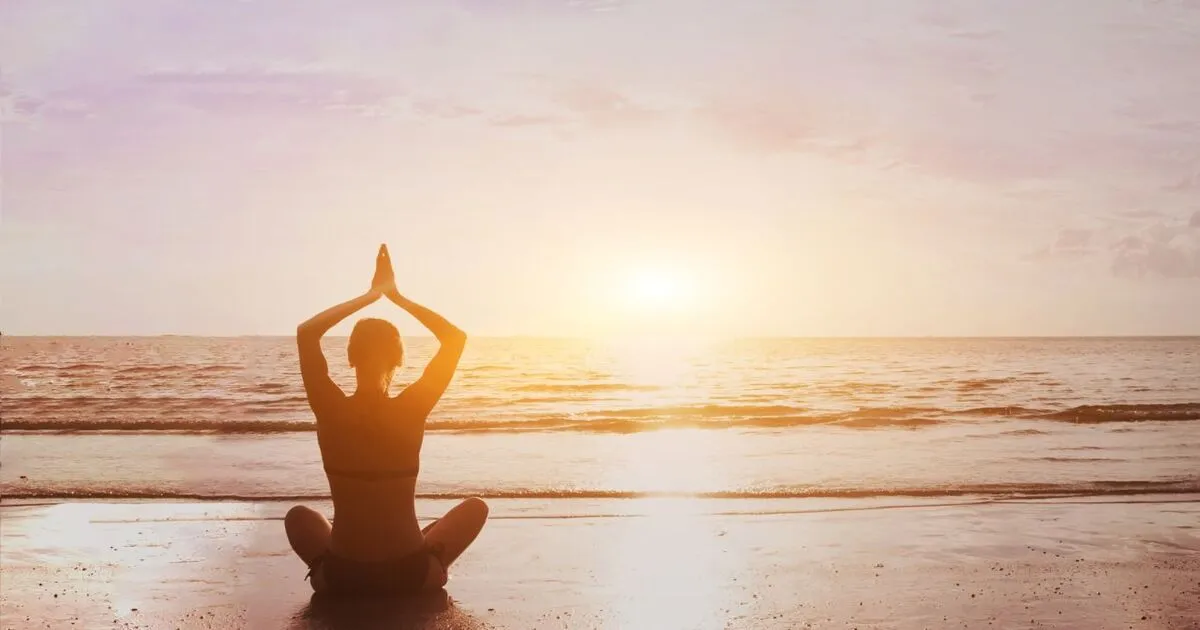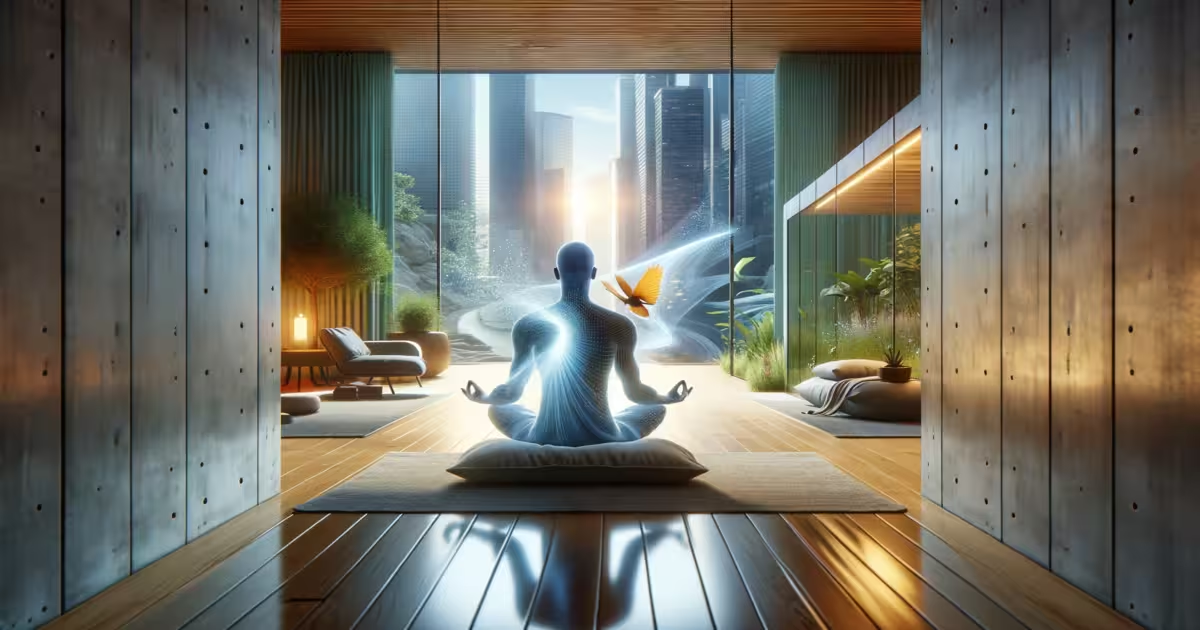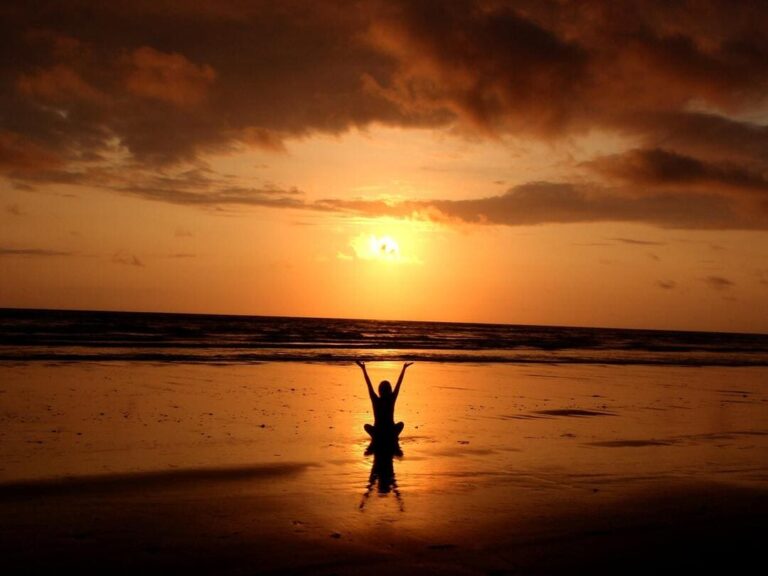What is Mindfulness? A Simple Guide for Busy Minds

As you settle in, allow yourself to take a deep breath. Do you feel a sense of relief? Mindfulness meditation, often discussed for its focus on awareness and transformative breathing, is more accessible than you might think.
Despite common perceptions, you don’t need decades of practice to benefit from mindfulness. The ability to calm your mind and push away negative thoughts is not found in any external solution it’s within your capabilities. So, how can you access this inner strength? Let’s explore together.
Key Takeaways from This Article
Subscribe to Create Higher Vibrations!
Get Inspiration and Practical advice straight to your inbox.
What is Mindfulness Meditation: A Personal Insight
Mindfulness, in its most simple expression, is about anchoring yourself in the present moment. Why is this so critical? Because it’s only in the ‘now’ that life happens, yet our minds often wander into the past or future, missing the magic unfolding right before us.
When discussing meditation, we often envision a ritual-based practice of sitting in silence, perhaps chanting or focusing on an object. But what if I told you that mindfulness meditation takes this to another level by marrying focused attention with present-moment awareness?
In my years of studying human psychology and spiritual development, I’ve come to see that this blend—this synthesis of meditation and mindfulness creates a potent formula for mental and emotional well-being.
This is not just about stress reduction or momentary calmness, although those are wonderful benefits. This is about gaining a new perspective on life itself, about cultivating a peace that stays with you long after you’ve left the meditation cushion.
What if you could carry this serene clarity with you throughout your day? Imagine the transformation that could bring to your relationships, your work, and your very existence.
I invite you to ponder this: How would your life change if you could live every moment with the richness it truly deserves?
Isn’t it time you found out?

Why Mindfulness Meditation?
In a world swirling with demands, distractions, and dilemmas, have you ever stopped to question why stress has become our constant companion? It’s as if we’ve accepted it as an inevitable part of modern existence. But does it have to be this way?
I’ve seen countless individuals struggle with anxiety, stress, and emotional turmoil. These are not abstract concepts; they’re real issues that can be corrosive to the quality of your life. But what if there’s a natural antidote, something so straightforward yet so transformative that it could alter your life’s trajectory?
Mindfulness meditation has been that turning point for many. One of my clients, a high-powered executive, constantly dealt with the pressure of decision-making. It was taking a toll on his mental health.
After just a few weeks of mindfulness practice, he noticed a significant decrease in his stress levels. He reported feeling more ‘in control,’ not just of his job but of his emotions and thoughts. This is not an isolated story. Many have rewritten their life scripts by incorporating this simple yet profound practice.
Is the harried pace of life robbing you of moments that could be spent in tranquility? Are you missing out on the vibrant hues of life because you’re constantly sprinting on a never-ending treadmill?
Mindfulness meditation offers you a way out, a way to drop anchor in the stormy seas of life. It’s not a magic wand that will make problems vanish, but it provides you with the tools to navigate challenges with a clear mind and a resilient spirit.
So, what’s holding you back from experiencing this transformation? The key to unlocking a life less ordinary is within your reach. Will you grasp it?
Techniques and Approaches: Your Guide to Inner Calm
Ah, the word ‘technique’ can be intimidating, can’t it? It conjures up images of complicated procedures and steep learning curves. But let me assure you, when it comes to mindfulness meditation, the techniques are far from daunting. They’re quite liberating.
Deep Breathing: The Soul of Mindfulness
Breathing is the most organic thing we do; we take it for granted. Yet, this overlooked act holds the key to mental clarity. Have you ever observed your breath? Not just a cursory glance, but a deep, introspective look?
Doing so can be an eye-opening experience. Deep breathing forms the core of mindfulness practices. The in-breath brings in fresh energy, while the out-breath expels negativity. A simple act, but profound in its impact.
Body Awareness: The Forgotten Language
We live in an age of disconnection—distanced from nature, from others, and most tragically, from ourselves. Body awareness is about rekindling that lost connection.
When you sit in meditation, pay attention to different parts of your body. Feel your toes, your knees, your shoulders. What sensations do you notice? This kind of awareness brings you back home—to yourself.
A Quick Guide for Beginners
I’ve seen this simple routine work wonders for people from all walks of life. It’s not a one-size-fits-all approach, but a flexible framework you can adapt to suit your needs.
The Science Behind It: More Than Just Mindful Musings
When people hear the word ‘science,’ they often imagine sterile labs and complex equations. But what if I told you that the tenets of mindfulness meditation are not just poetic philosophies but are backed by robust scientific evidence? Yes, the bridge between the ancient wisdom of mindfulness and modern science is not as long as you might think.
Psychological Benefits: Beyond Stress Relief
Mindfulness meditation isn’t just a balm for stress; it’s a catalyst for deeper psychological change. Studies have shown that it can help improve focus and attention, reduce symptoms of anxiety and depression, and even enhance emotional intelligence.
I’ve found that people who practice mindfulness find it easier to manage their emotions, which leads to improved relationships and a more fulfilling life. Have you ever wondered why some people seem to handle challenges with such grace? This practice might just be their secret.
Physiological Benefits: The Mind-Body Connection
It’s not just your mind that benefits from this practice; your body responds too. Various research indicates that mindfulness meditation can lower blood pressure, improve immune function, and even alter the structure of your brain for the better.
In the words of renowned neuroscientist Richard Davidson, “Mindfulness changes the brain in ways that anyone can see: it grows the regions associated with attention, memory, and compassion and shrinks those linked with stress.”
A meta-analysis conducted by Alberto Chiesa and Alessandro Serretti found that Mindfulness-Based Stress Reduction significantly improved mental well-being, echoing what spiritual traditions have been saying for centuries.
So, do you think of science and spirituality as two ends of a spectrum? What if they are two sides of the same coin, each enriching the other? Mindfulness meditation offers a harmonious blend of both, grounded in age-old wisdom and validated by modern research.
Isn’t it intriguing that something so deeply rooted in ancient philosophy has a place in the modern scientific paradigm? Could this be the harmonious blend of science and spirituality we’ve been searching for?

Common Misconceptions About Mindfulness Meditation: Let’s Clear the Air
How many times have you heard someone say, “Oh, mindfulness meditation isn’t for me—I’m not religious,” or “I can’t possibly sit like a pretzel for hours on end?” These are just the tip of the iceberg when it comes to misconceptions swirling around this transformative practice. Let’s set the record straight, shall we?
A Spiritual Endeavor or a Religious Ritual?
Many equate mindfulness meditation with religious practices, thinking it’s rooted in Buddhism or some other spiritual tradition.
While it’s true that mindfulness has historical ties to various philosophies, the practice itself is secular. I’ve seen people from all belief systems—agnostics, theists, atheists—benefit from it. It’s a tool for the mind, not a religious rite.
The Lotus Position: A Must or Just a Myth?
Ah, the iconic lotus position—legs crossed, spine straight, hands resting on the knees. While it’s often depicted in images related to meditation, it’s by no means a requirement. I’ve found that the most effective posture is one where you’re comfortable yet alert. Whether you’re sitting on a chair or lying down, the key is to maintain a relaxed but attentive state.
It’s Time-Consuming
Many think that you need to carve out large chunks of time to meditate effectively. In reality, even a few minutes can make a difference. It’s about consistency rather than duration. If you can devote even 5 minutes a day, you’re on the right track.
It’s About Emptying Your Mind
Another common fallacy is that mindfulness meditation is about emptying your mind. In truth, it’s about learning to observe your thoughts without getting entangled in them. You become a witness, not a participant, in the theater of your mind.
So, let me pose this question: Are these misconceptions holding you back from diving into an experience that could transform your life? It’s time to shatter these myths and discover the true essence of mindfulness meditation. Are you ready to take that leap?
Mindfulness in Daily Life: Not Just a Mat and Quiet Room
Let’s get real for a moment. How many times have you thought, “I don’t have time for mindfulness; I have a life to live!”? I hear you, but here’s the kicker: mindfulness doesn’t require you to escape from your life; it invites you to plunge deeper into it.
Mindful Eating: Savor, Don’t Just Swallow
How often do we gobble down our food while scrolling through our phones or thinking about the next meeting?
Mindful eating is the practice of fully experiencing your food—the texture, the aroma, the flavors. It’s not just about savoring delicious cuisine; it’s about appreciating nourishment in its entirety. When you eat mindfully, you not only enjoy your food more but also improve your digestion.
Mindful Walking: Every Step a Journey
Walking is one of the most mundane activities, right? But what if each step could be a revelation? Mindful walking is the practice of being fully engaged with each step you take.
Feel the ground beneath your feet, listen to the rhythm of your breath, and observe the world around you without judgment. Even a simple walk to the grocery store can become a meditative experience.
Mindful Conversations: Speak Less, Hear More
In today’s fast-paced world, conversations often turn into exchanges of information rather than meaningful dialogue. Have you ever considered engaging in mindful conversations?
Listen attentively, respond thoughtfully, and observe your reactions without letting them control the dialogue. This kind of conversation deepens relationships and turns simple interactions into meaningful experiences.

Quick Tips to Integrate Mindfulness
So, the question isn’t whether you have time for mindfulness; it’s whether you have the awareness to recognize its presence in every facet of your life. After all, isn’t life itself a sequence of present moments waiting to be noticed? Are you ready to open your eyes?
Frequently Asked Questions: Your Answers To Mindfulness Meditation
You’ve got questions, and it’s my mission to provide the clarity you seek. Let’s tackle some of the most frequently pondered queries about mindfulness meditation.
How Long Should I Meditate?
The length of your meditation isn’t about hitting a specific number; it’s about the quality of the experience. Even a few minutes of focused mindfulness can work wonders. Consistency, in my experience, far outweighs duration. Aim for at least 5 to 10 minutes daily to start, and you can gradually extend it as you become more comfortable.
Is It Okay to Have Thoughts During Meditation?
Absolutely. The mind is a relentless chatterbox; it’s what it does best. The objective isn’t to muzzle this chatter but to observe it without getting entangled. Thoughts will come; the skill lies in letting them float by like clouds in the sky.
Do I Need a Special Space to Meditate?
While a calm and peaceful environment can enhance your practice, it’s not a strict requirement. I’ve known people who meditate in bustling airports or during their commute. The key is to create a mental sanctuary, irrespective of your physical location.
Should I Use Meditation Apps?
If they help you maintain consistency, why not? But remember, the most potent meditation app is your awareness. Software can guide you, but the journey is ultimately yours to make.
Can I Meditate While Doing Other Activities?
Indeed, you can. This is often called ‘active meditation.’ Whether you’re washing dishes or taking a walk, you can practice mindfulness by being fully present in the activity. It turns mundane tasks into opportunities for mental enrichment.
Final Thoughts
So, you see, the extraordinary resides in the ordinary. Mindfulness meditation is not some esoteric concept tucked away in ancient scriptures or locked in the minds of enlightened monks. No, it’s a skill, an art form that lives within each one of us. And this art form has the transformative power to reshape not just your mind, but the very fabric of your life.
🌟 Schedule a session with Master Coach Vishnu Ra today. 🌟
You’re not just booking a session; you’re making a commitment to yourself, a pledge to discover the untapped depths of your mind. Whether you’re a complete novice or someone who’s dabbled in meditation before, personalized guidance can be a game-changer.
Master Coach Vishnu Ra will provide you with tailored mindfulness techniques that resonate with your unique life circumstances.
👉 Click Here to Schedule Your Session Now
This is your moment—the tipping point where contemplation meets action. Your path to an enlightened mind and a fulfilling life starts with this single, transformative step.
So, will you take that step? Your future self will thank you for it.
Namaste 🙂






